Eva Marie Saint on Acting
Hollywood Legend and Part-time Montecito Resident Discusses Her Craft
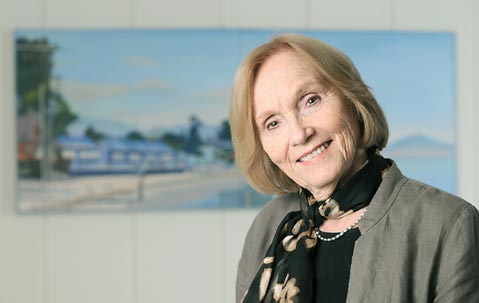
Academy award winning actress Eva Marie Saint has starred in a number of Hollywood films, Broadway productions, and television shows throughout her prolific career, and is widely recognized for her performance in Elia Kazan’s timeless epic On the Waterfront as well as her role in Alfred Hitchcok’s mystery classic North by Northwest. More recently, she was featured in the latest installation of the Superman series, Superman Returns.
Saint and her husband, Jeffrey Hayden, live in Los Angeles, but spend nearly every weekend at their Miramar Beach home that they built 46 years ago. How, you may ask, did The Independent gain such unrestricted access to the actress and her Montecito beach house? She’s my grandma.
How did you start acting? What developed your interest?
I was at Bowling Green State University where I had gone to become a third grade teacher. I was in my sophomore year when someone dared me to tryout for a play called Personal Appearance. It was a comedy. The role was a Hollywood siren with her hair up on top and a slinky gown. And I thought to myself, “Hmm. I don’t know. I’ll think about it.” But I had been around the theater on my errands and I could see people painting the sets and arranging the costumes; it seemed like an interesting “buzz-buzz” was going on there, very different from my other classes. So I took the dare. It was very successful, and everyone couldn’t believe that Eva Marie Saint from Albany, New York, was up there on that stage.
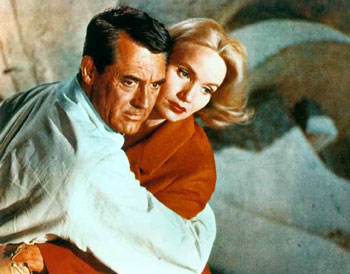
Had you acted before at all? Even in a school play?
No. I was always part of something. I was in the chorus in high school, not a soloist. I was on the basketball team. I was in modern dance, part of the group. I was a cheerleader, part of the group. I played the violin, part of the orchestra. I never wanted to be out there alone. Ever.
But, when I was in the play, I didn’t get nervous being on my own. I loved the rehearsal period. And I enjoyed the whole experience. Something started in my mind that got me thinking, “This was really exciting.”
Did you ever consider creating art in a different form?
When I was in high school, had I had a wonderful art teacher, I think I would have gone that way. I really secretly wanted to. I always loved paintings. I still dabble in watercolors a little bit. And Jeff and I have a modest collection of work; our paintings are an important part of our lives. And had I had a different teacher I might have gone that way. But I knew in my heart there’s something that I wanted to do that none of my friends wanted to do. None of them, even if they were in production, wanted to make a life of acting. That was such a practical time in life. People didn’t go off and do things that didn’t have a paycheck every month.
Back to that fateful play. How did it affect you?
So I thought about it, and when I went home that summer I wrote to my professor, Dr. Elden T. Smith. He was the father of my Delta Gamma House, and his wife was the house mother. So he was there; he saw me every day. And we all adored him; we all had crushes on him. He was the dramatic professor, the speech professor. So I wrote to him and I said, “Dr. Smith, I have this feeling that I might want to try and be an actress. You know me. What do you think?”
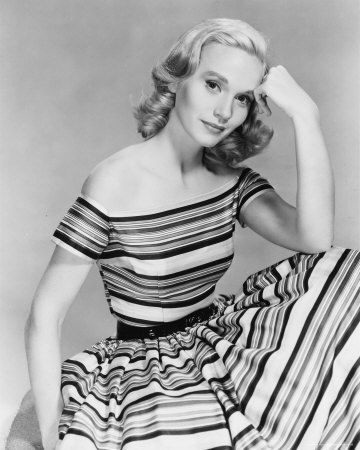
He wrote me very soon after that, a two-page, single-spaced letter (which I’ve always kept on my desk.) He wrote about the possibilities of teaching. He had met my family, and said he thought I came from a pretty solid family. He said he liked my voice and said that, because of my background, he thought I could take rejection. He talked about the possibility of something called television. (Remember, this was in 1946.)
But he didn’t badmouth teaching, and he thought I could be a good teacher and so forth. And he knew that I liked children. It was very interesting. He gave equal time, now that I think about it, to teaching and acting. But when I read it, I thought, “He thinks I can do it.” He believed in me. I never approached anyone about it. He became my mentor. However, I still had to talk to my mom and dad.
I said, “Mom and Dad, I have this letter from Dr. Smith. What would you think, how would you feel (remember, my mom was a teacher) if I changed my major from teaching to acting?” There wasn’t a very long pause, the roof did not come down, they didn’t go off screaming – they just both took my hand and said, “Whatever you want to do. Just do your best.” And if they hadn’t said that, I wouldn’t be sitting here talking to you about this work that I’ve been fortunate enough to be doing and have done through the years.
So how did you get the ball rolling in your career?
Well, I changed my major and got a bachelor’s from Bowling Green, and then started to go to New York. And my father, since he worked at the B.F. Goodrich Company, knew all the advertising agencies, and they sponsored all the talent. So I had to start making rounds. At this time my folks were living in Flushing, New York, so I could live at home and have dinner and sleep and be with my folks. But, with all of that, I assigned myself one year from the time I started making rounds to when I would be financially independent.
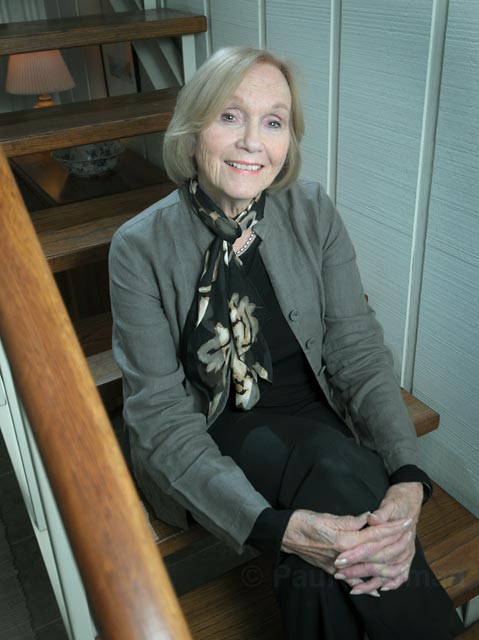
Radio took me a whole year to break into, because there were a few actors who were wonderful at it. And that’s how you made money. That’s how you made $30 a show, and that paid the rent. Rent in those days was $85 a month.
So I finally broke in radio and my first job was, “This is your long distance operator. Number please.” And then I did soap operas, like the show Rosemary, because they really paid a lot of money in those days. But in the meantime I was doing television, and the first show was the Borden Show. It was a variety show. My first role was applauding off camera. I called my folks and said, “I’m on television! Well, not really on television. I’m offstage. But you’ll hear me.” They tuned in – so supportive!
The next week I called and I said, “Folks, guess what? I’m on camera!” I was just sitting at a table (I don’t think they even saw my face). It paid $10, but I was in the hole because I had to buy a nice new dress. Then I did another commercial as a cheerleader on a variety show that went: “Keds are keen. Keds are neat. Keds are best for the family’s feet. Wear ’em!” I learned at that point that no matter what you did in your life, you can use it in your acting. I’d been a cheerleader. Another one I did for a linoleum company: “We welcome you all to the Bonnie Meade Show. Relax, and have fun, for we’d like you to know: When you buy Bonnie Meade at any good store, you get quality something something : “
At this point, were you on your own? Did you have a manager or managing company?
No, at that time I don’t think I did. But, I had a little booklet and I’d get up and out at nine o’clock in the morning and I’d make my rounds. I’d find out where the auditions were, I’d find out who was casting. Like I said, I did work in radio and television. I also did modeling. But I really disliked the modeling. I felt very, very self-conscious. Why? Because you are yourself. You’re not playing a role; you’re not somebody else. You are you. Whatever is there, it’s you, and you’re not creating a different person. I was just really self-conscious. To this day, I admire models. When I watch them go down the runway, and they’re absolutely vacant – I don’t know how they do that. So I was not successful in the [modeling work] I did, because I didn’t look blank. I always added something, or was having a good time. It took away from the clothes.
Between the commercials, between the television shows and the modeling, I was able in a year’s time to be on my own. I had met a young woman, Peggy Lobin, who was very successful in radio. And we found a place on Morningside Drive for $85 a month. There was one room. Peggy had her twin bed with her dresser, I had a twin bed with my dresser; and there was the kitchen and bathroom, all in one room. We had a tub, and when we wanted to prepare dinner we had a thing that we’d put over the tub to make a table. When you think about it now it sounds so gross, but we were so happy to be in that apartment.
Mrs. Abernathy was the landlady. She always had her hat on, in bed, while shining her shoes. If you ever wanted to see her you would knock, and she would be in bed shining her shoes with her hat on. She said there were three things she wouldn’t allow in the room: boys, smoking, or alcohol. But once I did a commercial for Pabst Blue Ribbon Beer, and when I got paid they sent a whole case of beer. It got there before I did. This time Mrs. Abernathy was up, with her hat on, waiting for me to come in. She said, “Now, what is going on here?” I told her that my dad liked beer and I’d give it to him. We didn’t get in trouble. God, if we had been pushed out of that apartment, we would have been heartbroken. We loved it.
What was it like to live with another actress?
Now I’ll tell you. Things happen for a reason. Peggy was very successful. As we both became more successful, we moved into a basement apartment in Central Park East. It almost ended our relationship, because the phone was always ringing for Peggy for a radio job. Later on, when I started thinking about men, and thinking that I wanted someone to share this great new life I was living with, I realized that it would not be good to be married to an actor. There’d have to be jealousy. I was jealous of my friend Peggy. I really was. So I learned that an actor-actor marriage relationship would not be a good thing. And that stuck with me. And I never, ever dated actors.
At this point, what level had your career reached?
So by this time I was starting to get nice roles on television. I felt very comfortable in the studio; I had been in a number of small roles. But I’d watch the stars. I’d learn the decorum in a studio and the relationships between the actor, the director, the other actors. So by the time I started getting really wonderful roles it was like being in the theater because you would rehearse two weeks in the old Friendship Club in New York. And the writers were always there.
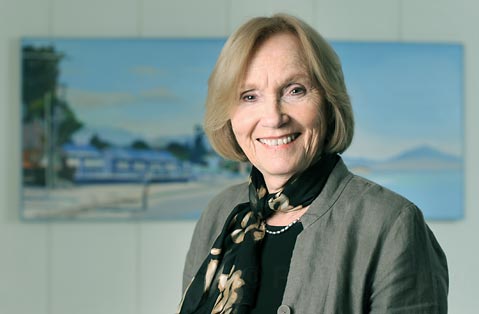
Nowadays you do a movie or whatever, there are 10 writers on it. But back then there were just a few writers, or just the writer. If something wouldn’t be right, you’d go out to lunch and you’d talk about it. Then you’d come back, and while you were doing another scene, the writer(s) would be working out the problematic scene, and by the time the day was over, you had nailed that scene. To this day I have such feelings for writers. You know I admire them so. Actors can be good, say all these beautiful, wonderful things – but where does it come from? It comes from the writers, and people kind of forget that sometimes.
What formal training were you receiving then?
While I was in New York, I was studying at the Theater Wing which was with Herbert Bergoff, and then I went to the Actors Studio and was there for about 10 years before we came out to California.
What do you think was the key television role that put you in the public eye?
One was Middle of the Night. I was the younger woman with the older man who was played by E.G. Marshall. Those were live shows, of course. It was so interesting. I would go shopping on the town the next day, and one time three different young women stopped me on the street and said, “An older man is interested in me. Do you think it would work out?” It was just really interesting, because there just weren’t that many network shows and a lot of people would watch them.
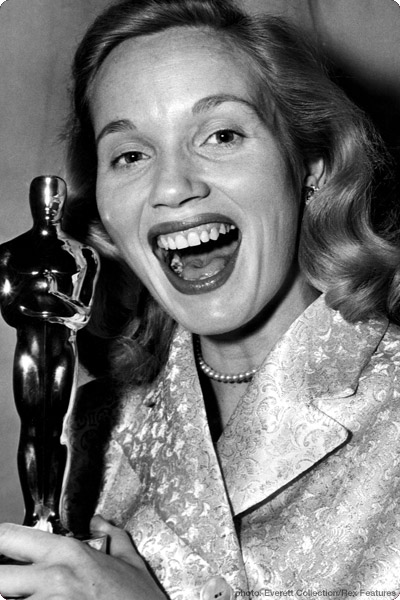
Talk to me about shooting live. What was that like?
Terrible, funny things happened. One was in One Man’s Family. (Just a little side note: That was the only series I’ve ever done, and I’ve never wanted to do another one. Why? Because, if the writer is good for the series they write for you. I played Claudia, and I kind of was Claudia. I thought, “You’re playing yourself. You’re not creating a role.” Also, the series becomes your family, but I wanted my own family. And as I got older and I would see how a series goes on and on and the cast becomes your extended family – and I think it’s wonderful – but it wasn’t for me. I wanted a real family. I didn’t want a make believe family.)
Anyway, I was playing Claudia and I was on the plane with my father-in-law. In those days the cameras were very close with big red lights – they were right there. It could have been distracting if you weren’t in the right mindset. In the middle of the scene, he turned to me and said, “Jesus Christ, I’ve blown the scene,” because he had forgotten his line. I just turned away from him and I said, “Father Roberts, I think I’ll take a nap.” And I put my head down by the window and Eddie Kahn, the director, went to commercial.
Now we had to continue, because this was live. The actor was panicked, but I said, “No one noticed. Just pull yourself together and it’s going to be fine.” I got him back on track and we continued. At the end of that show, I sat on that airplane – and I had never had a shot of whiskey in my life – but I said to the director, “I need a shot of whiskey. Shot of whiskey, please!”
We did an episode of Person to Person, a big network show with the great Edward R. Murrow. He would interview two celebrities per show – Don Hewitt was the producer at CBS. So they came to the apartment and they set up all the gear and we were just about ready to go live on the air, but right before, I whispered, “Oh my God, I have to go to the bathroom.” Don Hewitt, at master control, said, “Go ahead.” By then I had the microphone strapped on. So I went into the bathroom to do my thing, and went on air as soon as I got back. After the show, Don Hewitt said, “Oh, by the way, I plugged you in to all the stations on the network and everybody across the country heard you pee.”
Were you more nervous when shooting a live show?
No, because you had to be on your toes. I learned quickly that I needed to know how everything was planned out so I could get comfortable. One time on set I went from the living room to the bedroom and the costumer changed my clothes during the commercial, but I was in the wrong clothes. I just hadn’t thought about it. From that time on, I wanted to know where everything was – even if it’s in the theater – and I wanted to know that it was all planned out.
It was an incredible learning experience. I would not have wanted any other experience, because I’ve never been nervous since. It was a bloodbath. I don’t get nervous on a stage, I don’t get nervous in interviews. I don’t get nervous. (On the L.A. freeway, yes.) I think the more you know about something, the more secure you are and the more relaxed you are. That’s the key. Actors now will never know what it was to be live on television. The things that could happen, and the things that did happen :
Tell me a little about your creative process. Is that something you developed over the years? Were you taught specific techniques?
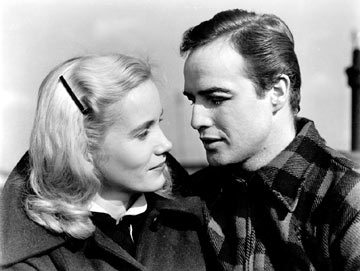
The creative process is, I find, difficult to talk about. Actors can on and on and on. They write books about it. Some actors find it a little more difficult, as I do, to articulate. I think I found my way of doing things at the Actors Studio. I was very shy. Sometimes I still am in big crowds. Lee Strasberg, when he got to know me a little bit, gave me a scene to do where I had to cry in front of my peers. I worried about it, because although I came from a loving family, we did not cry in front of one another. So that was a big barrier. Lee gave me a scene where I had to cry; I worried about it, I worked on it, I tried to use what I was learning at the studio. I finally did the scene, and I cried, and my peers were crying with me. It was just an incredible moment for me. I broke through a barrier and realized no one was going to laugh. That was truly a breakthrough, using my instrument. Using it the way I was learning at the Actors Studio. That was a signpost in my career, it was so important.
I know what I used to cry. I can watch movies that I’ve been in, and if there’s an emotional scene, I remember specifically what I was using, what I was thinking about, because I am very specific in how I work.
And also, when creating characters, I love to watch people. My husband, Jeffrey, gets upset because I would like to get to the airport an hour or two beforehand – back then you could show up 20 minutes beforehand – because I loved to watch people. I could sit there and watch people forever. I would remember the walks. I would remember listening to them, their facial expressions. It’s constant learning. Strasberg once said, “The time between jobs is as important as the jobs themselves.” That’s the time when you’re living. That’s the time when you’re observing. That’s the time you’re interacting with other people. Very often, characters are a combination of people. I’ve used my mom a lot.
What do you tell young actors when they ask for advice?
I tell young actors that they must study. They think they can do one shot and be on a series. I don’t mean to be cranky, but – especially because of celebrities – a lot people nowadays think they can be on one show and be set for life. It’s a slow process. They’re not ready for it if they don’t work at it, if they don’t study. And waiting for that phone to ring, for that job, can be a very lonely situation. When you’re studying, you’re working with other actors.



